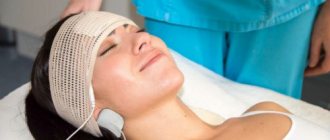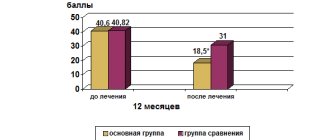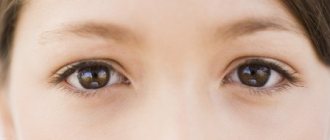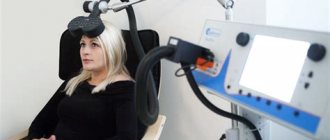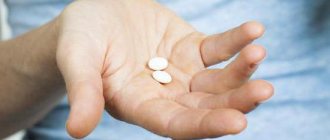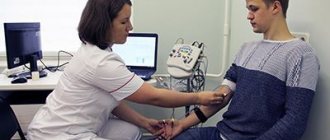Treatment of depression in Moscow - individually adapted programs. We use special psychotherapeutic techniques in combination with restorative medicine techniques. The cure is fairly quick and does not involve the use of potent or addictive drugs. Includes individual selection of methods of psychotherapy, biotherapy and lifestyle changes in each specific case. We use the body's hidden reserves, which determines our effective therapy.
Modern hospital replacement techniques using active neurometabolic therapy provide a quick and sustainable effect. Brain Clinic does not use ineffective or ineffective methods of treating depression.
If depression begins to envelop a person, it begins to seem that this dark streak will never end. That happiness and joy of life do not exist for you in the world. Depression reduces the quality of life so much that the person himself begins to help the disease in suppressing his own will and attitude. The sensations of life become dull and a person can no longer fail to see joyful moments.
However, we know that even the most severe depression can be treated. We prove this every day, helping people return happiness and a sense of joy every day to their souls. Researching treatment options for depression will help you decide which approach is right for you. And we will help you individually adapt and properly carry out treatment for depression. Together we will definitely defeat this disease.
Why Our Depression Treatment Always Works
Treatment of depression in Moscow at Brain Clinic has its own characteristics. We take into account the individual parameters of a person and the usual rhythm of a person’s life. The clinic’s specialists use hospital-replacing methods of restorative medicine that are able to treat depression as quickly and effectively as possible. We take into account all factors influencing the duration of therapy and reduce the time as much as possible.
Brain Clinic doctors have extensive positive experience in treating depression in Moscow. We take into account not only the features of metabolic processes, physiology and structure of the nervous system, but also the features of the human environment. We take into account the influence of the social structure in which the patient is located, which is very important to obtain a quality effect. Our doctors will be able to correctly determine the true cause of a depressive episode. We tailor the therapeutic program individually. This allows you to completely protect the recovery process of nervous activity and eliminates the negative impact on the body.
Our treatment is based not only on obtaining a quick effect, but also on the long-term effect of therapeutic influence.
Call +7 495 135-44-02
We help in the most severe cases, even if previous treatment did not help. Treatment at the clinic is guaranteed on an anonymous basis.
Treatment of depression in the clinic
Based on current evidence, we argue that depression is not an underlying disease; it is a symptom that indicates that your nervous system requires specialist help. We cure depression by viewing it as a temporarily damaged part of the whole organism, which helps to cope with this temporary illness. That is why we put full-fledged diagnostics at the forefront. We consider depression in the context of the integrity and individuality of the body as a single system. Correct and accurate diagnostics combined with a wealth of experience and fundamental knowledge give us the opportunity to select individual programs. As a result, treatment of depression in our clinic is always effective.
The final result depends on the completeness and correctness of diagnostic manipulations, as well as on experience. Intermediate periods of improvement do not always indicate correct treatment for depression.
Brain Clinic doctors have extensive experience in treating depression of various types. First of all, our therapy is aimed at maximizing the safety of the methods used for the human body.
Call
Treatment for depression at Brain Clinic is provided on an anonymous basis. All personal data is securely protected.
Treatment of depression in the clinic is carried out using the most modern hospital-based methods of restorative medicine. We try to traumatize a person’s psychological state as little as possible with therapeutic measures. The priority of our doctors’ work is to restore the temporary imbalance of the nervous system and its performance, and not the usual removal of symptoms.
Nuances associated with the procedure
Before deciding on such treatment methods, you should carefully read the rules for its implementation. There are a certain number of restrictions that must be adhered to. First, let's look at how a sleep deprivation EEG is performed. The use of electroencephalography is necessary in order to observe brain activity both during nervous excitement and at rest.
The use of this method of diagnostic examination allows us to identify certain consequences of artificial refusal of sleep. You can combat the feeling of drowsiness during the procedure using various irritants. Bright lights and loud sounds will help reduce the desire to fall asleep and increase physical activity.
It is also important to say that such measures should only be used with the parallel use of antidepressants. The effect of these drugs should normalize the patient's condition and increase the level of physical activity. The most commonly used drugs are Venlafaxine and Fluoxetine, due to their mild effect on the body.
Treatment of depression in Moscow
In the capital, life is always more stressful and intense. This is why we often encounter very “exotic” manifestations of mental and psychological spectrum disorders. In Moscow, more often than in other regions, various forms of hidden depression occur. This is due not only to the busy rhythm of life, but also to the “floating” diet, work and rest. In this regard, treatment of depression in Moscow has a number of very important features, without which any therapy will be ineffective or ineffective.
One of the most difficult tasks of a doctor when treating depression in Moscow is organizing comprehensive medical care in the conditions of a metropolis, its rhythm of life and establishing an accurate diagnosis in the shortest possible time (in the early stages of the disease). With regard to depression, the situation is complicated by the fact that the picture of the disease can be very different from the classic form. Many scientists believe that improved living conditions, the disappearance of many serious diseases, and the use of powerful drugs have led in recent decades to the emergence of erased or mixed forms of the disease. Treatment of depression in Moscow began to require new forms of approach, obtaining quick results.
Many metropolitan doctors, in their clinical practice, encounter patients with disorders of bodily sensations. This can be expressed by pain, numbness, goosebumps, etc. Patients undergo a large number of unnecessary examinations, visit all kinds of specialists, and take mountains of medications to no avail. Nowadays it is very rare for a person to be correctly diagnosed and given effective treatment for depression from the first visit. In Moscow, when treating depression, this has already become natural. Imagine the surprise of doctors when the result of psychotherapeutic influence is the disappearance of chronic pain, restoration of the functioning of internal organs and normalization of the autonomic nervous system. Such depression is called somatized (from “soma” - body (lat.), since it affects bodily functions) or masked (the true manifestations of depression are masked by physical equivalents). In any case, it is important that the patient comes to the right specialist (psychiatrist or psychotherapist) on time to begin proper treatment for depression in Moscow or any other city.
Treatment of depression in a private clinic
Due to the low efficiency of medical care from government medical organizations and the high likelihood of subsequent consequences of contacting government agencies, people turn to private clinics. Treatment of depression in a private clinic is carried out on an anonymous basis and registration is excluded here. And the quality of medical care in most private clinics is much higher. Although, there is a fairly high chance of ending up with ordinary swindlers in white coats.
Treatment of depression in Moscow clinics can be carried out using medications, psychotherapy or complex methods. In most cases, a course of treatment with antidepressants is required.
It is important for the patient to understand that the effect can be felt no earlier than 10-14 days from the start of therapy. This is due to the peculiarities of the interaction of drugs with the human body. The side effects that occur in the first days will disappear over time. As the condition improves, the frequency of visits to the doctor will decrease to 1-2 times every 2 weeks. But you should not lose your vigilance and complete the course of treatment before your doctor cancels therapy in order to reduce the risk of relapse of depression.
In the case of treatment of severe depression, hospitalization may be recommended for the patient. The advantages of this medical care system include higher efficiency.
Tips for treating depression
It is important to determine what is causing your depressive symptoms. It is necessary to establish the true cause of the formation of this disease. The severity and true causes of your condition are the most important factors determining the treatment method for depression. The more severe the depression and the more severe the complaints, the more intensive the treatment you may need.
Do not try to cope with the disease on your own. Since what worked well for one person, it will be contraindicated for another. This is due to various individual characteristics of the body and various formation factors. It takes special knowledge, experience and time to find the right treatment. Finding the therapy and recovery that works best for you may take some time. If you decide to begin treatment for depression, you may not immediately be able to find a doctor with whom you can overcome depression.
If you need to take medications, do not forget about physical activity, which will be determined by your attending physician. Do not ignore your doctor’s recommendations about the need for psychotherapy and other types of therapy. Follow your healthcare provider's recommendations. And, be ready for change!
Don't rely on medications alone. Medications can help relieve symptoms of depression, but this is not usually enough. Other types of treatment, including exercise and psychotherapy, can significantly increase the effectiveness of treating depression. If you are taking drug therapy, remember that medication works best when you make changes in your lifestyle.
Social support. By expanding your social connections you reduce the time and increase the effectiveness of therapy. If you have complaints of depression, do not hesitate to talk about it with loved ones or friends, seek support in group psychotherapy sessions. Asking for help is not a sign of weakness, and it will not mean that you are a burden to others. Often, simply talking to someone face to face can be a huge help.
Treating depression takes time and personal commitment. Remember that all treatments for depression require time and your active participation. Sometimes patience is lacking and can cause frustration in treatment. This is fine. The process of restoring the nervous system has its ups and downs.
What is sleep deprivation
Often this method is used to treat depression with elements of apathy. This method was developed in 1966 by Walter Schulte. According to his research, sleep deprivation improves the condition of people suffering from psychogenic and endogenous depression, therefore it is often used as one of the ways to overcome depression.
Sleep deprivation allows you to quickly lift a patient out of a state of even very deep depression, but this method is unlikely to be able to completely and completely defeat depression as a disease. Therefore, drug treatment methods are increasingly being used to treat this disease, giving reliable results, and sleep deprivation is used as an initial aid to quickly recover from a state of apathy.
Now opinions on the effectiveness of sleep deprivation as a way to overcome depression vary greatly among all specialists. Some people respond enthusiastically, noting its rapid effectiveness, while others, on the contrary, criticize it.
However, everyone can try to apply this method on themselves. To do this, in the evening, instead of going to bed, one continues to be awake and then the person goes to bed only the next evening. But after some time after using sleep deprivation, depression is likely to return and you need to be prepared for this. So is it worth the pain? Everyone decides for themselves.
How many sessions are needed?
To achieve a more or less stable state, it is necessary to conduct several such sleep deprivation sessions. But whether it will be possible to completely overcome depression as a disease is not known for sure. Everything will depend on the individual characteristics of the individual’s body, and before you start experimenting, you should contact a specialist; for this you can resort to.
At first glance, it may seem that overcoming depression using the deprivation method looks like a paradox: a patient exhausted by a depressive state cannot sleep normally, and he is also forcibly deprived of sleep. But this method has its own meaning. Everything can be explained this way: the patient is deprived of proper sleep, and deprivation causes him a kind of stress, which leads to the fact that catecholamines begin to be released in his body - these are mediators of the most important physiological processes in the body, which maintain it in a state of excitement.
And an increase in the state of excitement leads to stimulation of a person’s psychological mood. As a result of using the deprivation method, there may be a state of euphoria, which suppresses the state of depression.
Scientists believe that in ancient Rome, to relieve stress among soldiers, military leaders forced them to stay awake for two or even three days.
Effective treatment for depression
We use only effective and completely safe psychotherapeutic techniques together with modern restorative medicine. All therapeutic programs are selected according to the individual’s individual parameters. Hospital replacement technologies of therapy and rehabilitation of restorative medicine are used. The most modern developments of leading scientific and practical institutes, which are recommended by the WHO International Ethics Committee, are recognized as the safest and most effective means of treating depression. We are guided by the fact that depression is not just a chemical imbalance in the brain. Medicines traditionally used to treat depression can help relieve symptoms of even severe depression. However, they do not always correct the underlying problem. Often therapy requires a long-term solution to the problem. Therefore, we use not only the most modern technologies, but also our own complex techniques, which have shown high effectiveness in treating depression.
We are fighting the cause, not the effect. There will be no reason, this oppressive state will go away. We consider depression from a modern perspective, as a syndrome that indicates the presence of one or another disorder of the nervous system and we eradicate the cause of depression, and not the syndrome - depression.
For new mothers - Postpartum depression
Modern approach
Depression does not always require treatment. Very often we come across cases where one meeting between a specialist and a person is enough, and that’s where the treatment for depression ends. These symptoms leave the person forever, and the mood, sleep and general condition of the body are restored. Various physical ailments also go away, and the quality of life improves significantly.
It is no secret that when depression develops, the brain begins to process incoming information incorrectly, so a person’s condition worsens and he can no longer get out of depression on his own. This requires specialized assistance from a psychotherapist for differentiated treatment of depression, which will be based on suppressing the true causes of depression, and not just relieving symptoms.
The most common, but not always correct, advice for treating depression is to use psychotherapy as monotherapy, as the main and only method of treatment. The use of hypnosis or psychoanalysis, breathing techniques. These techniques for many types of depression are either not effective on their own or are strictly prohibited. Psychotherapy can and should be included in the treatment plan for depression only after the person’s condition has completely stabilized. Only in this way will psychotherapeutic techniques be most effective. When the brain is able to correctly perceive and process specific therapeutic information, psychotherapy becomes necessary in the treatment of depression of any origin.
Mechanism of sleep deprivation
Based on the results of the studies, we can say that the biochemistry of the mechanism of therapeutic fasting is similar to the mechanism of sleep deprivation.
The mechanism of sleep deprivation and fasting has a common point in that the body releases the body's energy resources from its depot when under stress. This leads to a feeling of increased energy and increased brain activity. But this effect is unstable and has a “ricochet” effect, when symptoms can return with renewed vigor. They can be used for low mood and mild symptoms of depression. Therefore, it is necessary to treat depression even with non-traditional methods under the supervision of a specialist.
Scheme of action of deprivation
All processes in the body of a healthy person occur strictly periodically and correspond to twenty-four hours (sleep, body temperature, heart rate, blood pressure and the metabolic process in the body). If a person suffers from depression, all these processes are not coordinated (menstrual cycle irregularities in women, mental outbursts acquire a peculiar sequence - at first the person is in a depressed state, and by the evening he is awake and active).
This means we can conclude that the inconsistency and disorder of the physiological and biochemical activity of the body is the main factor of depression (OH...). And the deprivation method allows you to restore the cyclicity between these processes in the body and defeat depression.
Most often, the method of sleep deprivation is used to treat depression, which is accompanied by apathy, which leads to inhibition and the appearance of obsessions, increased self-criticism and low self-esteem.
The relationship between sleep deprivation and various depressive conditions in the human body
- Seventy percent of patients show positive dynamics in the treatment of manic-depressive psychosis.
- Thirty-three percent of patients recover from neurotic depression.
I would like to note patients suffering from melancholy depression, who respond better to treatment than all other patients; anxious depression is much more difficult to treat, and it is practically impossible to overcome depression masked by this method.
Observing the recovery trend of patients, we can say that the effectiveness of the sleep deprivation method is directly proportional to the severity of the disease.
Who has depression?
Depressive states can be observed in every person, but not everyone develops these states into painful, long-term disorders that reduce the quality of life. However, our treatment for depression always produces a positive effect, regardless of the patient’s gender and age.
Depressive states of a person are associated both with the social environment and with various individual life situations and characteristics of the development of the nervous system of each person individually.
Establishing an accurate and complete diagnosis and identifying the true causes of depressive conditions is the key to obtaining positive results in the treatment of depression.
Depression is curable!
And this is worth remembering for everyone, especially people suffering from this disease. It is important to know a few rules so that the result is complete and the treatment does not take a lifetime.
How to treat depression
- Find a competent and conscientious specialist;
- Seek help in person;
- Follow all the doctor’s instructions, completely trusting him;
- Don't look for shortcut solutions to the problem;
- Any questions you may have during treatment should only be resolved with your doctor;
- Remember, treatment for depression is carried out only by a psychotherapist or psychiatrist;
- Contacting psychologists of different directions will lead to complications;
- If treatment for depression takes an unreasonably long time without results, look for another doctor;
- Therapy should be comprehensive, combining several techniques;
- Do not violate the prescribed regime.
Only in this case will the treatment of depression be complete and safe.
Remember that you can always find effective help and support from our specialists. Treatment for depression in our clinic is completely tailored to each individual.
Don't panic! Despite the fact that depression is often accompanied by various somatic disorders and feelings of physical illness (pain, gastrointestinal disorders, cardiovascular disorders, impaired autonomic nervous system, etc.), diseases with similar symptoms respond well to treatment!
Such disorders are described on the pages of our website in the “Psychosomatic Disorders” section.
You can learn more about the problems of treating depression and the types of depression in the article - Depression.
We do not use methods that are not effective or proven.
Sleep deprivation - mechanism of action
First of all, you need to increase the period of time during which the patient does not sleep, but is awake, and bring it to approximately forty hours (the patient wakes up as always in the morning, and then does not sleep all day, does not sleep at night, and also does not sleep the next day ). Only the next night can the patient be allowed to sleep for ten hours.
The patient’s condition may improve after the first use of the deprivation method, but, unfortunately, the improvement will not last long. In order to establish such a condition, it is necessary to apply the sleep deprivation treatment approximately six times, and perhaps more times.
Improvement in a patient with depression, as in many other diseases, is gradual and smooth. At first, the patient's condition may even worsen, but this will not last long. After using the sleep deprivation method, people fall asleep much faster and easier. With an increase in the number of procedures, the patient's mood and positive attitude gradually improves.
Contraindications for using the sleep deprivation method
The deprivation process has a targeted effect on certain areas of the brain. Therefore, absolutely no harm is caused to those areas of the brain that do not take part in the formation of a person’s depressive state. But this method should be used extremely carefully for patients with hypertension. You should also pay attention to the use of the deprivation method in patients suffering from any chronic diseases.
In any case, by contacting the Transfiguration Clinic, you can get extensive and detailed advice on the use of the deprivation method to overcome depression, its features, the mechanism of the treatment process and its possible results: phone number in Moscow Calls within Russia are free.
We do not believe in miracles, we treat problems in difficult people with the help of medicine and kind words. You can contact the clinic’s specialists by phone in Moscow.
Methods used in the clinic
Medication method - drugs are used that improve and normalize the metabolic processes of the brain, stabilizing hormonal levels and physical condition. Depending on the condition, the causes of the disease and individual characteristics, drugs can be used in various combinations and doses. We use antidepressants, neurometabolic therapy, antipsychotics, mood stabilizers, vitamins, and amino acid therapy. Also, if necessary, other drugs may be prescribed for individual therapy.
The use of drug therapy is always justified and rationally selected on an individual basis. Self-medication causes complex complications. In some cases, antidepressants, tranquilizers and other drugs may be strictly prohibited for use!
Psychotherapeutic method - we use a wide range of techniques that our specialists masterfully master. The main methods of psychotherapy for depressive disorders are existential psychotherapy, psychodynamic psychotherapy, cognitive behavioral psychotherapy, trance methods of psychotherapy, etc. The methods are usually used sequentially, in reasonable combination with each other. The use of only one technique in psychotherapy in the treatment of depression is usually either ineffective or does not bring the desired result at all. In most cases, hypnosis and trance psychotherapeutic techniques are strictly prohibited!
Physiotherapeutic methods are used in the treatment of certain types of depressive disorders. They are prescribed individually and are carried out strictly under the supervision of a specialist. In most cases, physical therapy is contraindicated. Physiotherapy may include procedures such as light therapy, color therapy, music therapy, therapeutic sleep, mesodiencephalic modulation, etc. Physiotherapy techniques cannot be the main method of treating depression.
No sleep, no rest for the tormented soul
Sleep is one of the basic needs of the human body, and its lack leads to severe psychological and physical stress: not only mood and cognitive abilities suffer, but also the cardiovascular system and metabolism. However, for almost 50 years, sleep deprivation has been used to treat one of the most severe and terrible conditions for the human psyche - depression. We decided to look into what forced sleep therapy for mental disorders is, why it can be effective, and why it should be used with caution.
Anyone who has at least once not slept for a long time knows perfectly well what this is fraught with: lethargy appears, attention decreases, mood deteriorates and severe physical fatigue occurs. Available stimulants like caffeine stop working (this is their rather limited mechanism of action), and the only way out is still to take a break and rest.
With chronic lack of sleep and insomnia (we talked about it in detail in the material “Your words lull you well,” prepared for World Sleep Day last year), deeper and more serious conditions and diseases are added to the superficial symptoms.
For example, the consequences of lack of sleep include cardiovascular diseases, problems with nutrition and metabolism (from overeating to type 2 diabetes), as well as various mental disorders. Last but not least, lack of sleep is closely linked to depression, which is surprising in its own way because sleep deprivation is often used to treat it, and at times quite successfully.
At least this is what meta-analyses indicate. One, conducted in 2021, focused on 66 studies published from 1974 to 2021: it found that sleep deprivation was effective in 50 percent of patients in randomized control trials and 45 percent in other studies. The effect did not depend on what experimental technique was used, what drugs the patient was on, as well as on his gender and age.
The authors of the study call the effect significant, but given the fact that no covariates could be found that would provide the desired effect, the result can be called random - of course, if we consider the use of sleep deprivation as a binary variable. In other words, when psychiatrists prescribe forced sleep medication to depressed patients, it may or may not help, depending on your luck.
At the same time, sleep deprivation is still considered a fairly effective way to treat depression, and why this is so (even if it is intuitively clear that lack of sleep is more likely to be harmful) should still be understood.
Experimentally intervene
The relationship between sleep quality and mental disorders is complex. First of all, the connection between them is two-way: insomnia, as well as hypersomnia - excessive sleep duration and daytime sleepiness, are considered both symptoms of depression and factors that largely influence its development.
First of all, therefore, in case of depression, it is necessary to restore normal sleep hygiene: do not eat several hours before going to bed, go to bed at the same time, sleep the number of hours recommended for age (for an adult - about seven to eight hours a day) and do not postpone your vacation until the weekend in anticipation of the cumulative effect.
Understandably, this can be quite difficult; in this case, patients with depression are prescribed drugs from the group of antipsychotics or other substances with anti-anxiety (trouble, as we know, does not come alone: with depression there is a higher risk of developing anxiety) or sedative effect.
But for the first time, the fact that sleep deprivation can have a therapeutic effect on depression was discovered and studied by the German psychiatrist Walter Schulte in the early 1970s. He saw three patients diagnosed with depressive disorder: two teachers and one doctor. Each of them reported to Schulte that after a sleepless night of work or exercise, they felt an improvement in their mental state.
Of course, it is impossible to base an entire psychiatric practice on three cases, therefore, after the first statements about the benefits of sleep deprivation (after Schulte, two more of his colleagues managed to achieve a significant effect in 23 out of 34 patients), scientists began to actively conduct research.
First, it was necessary to establish exactly how many hours of sleep deprivation were needed to achieve at least some effect - and at what time to start the experiment. Typically, sleep deprivation therapy involves a whole day (or even more: sometimes up to 36-40 hours) of forced wakefulness: the patient is woken up around one in the morning, after which he does not sleep the entire next day and sometimes the entire next night.
With this therapy, taking any central nervous system stimulants (even coffee) is excluded, and it is also recommended to combine forced insomnia with light therapy (however, both are considered branches of chromatherapy - artificial “tuning” of the sleep and wakefulness cycles).
The effect occurs quite quickly: with sleep deprivation, a patient with depression immediately experiences visible improvements. However, this is a rather deceptive success: studies indicate that in 50-80 percent of patients the state returns to the usual depressive state after they do sleep. Moreover, in 10-15 percent of patients, improvements, on the contrary, appear only after sleep following deprivation. In 2-7 percent of patients, the condition may worsen, and symptoms of mania may be added to depression (sleep deprivation, therefore, is not recommended for people with bipolar disorder - even in the depressive phase).
Some vagueness of the effect may be explained by the fact that a day or more without sleep is still quite painful for the body. Therefore, scientists tried to reduce the time of forced wakefulness to several hours at night. To do this, for example, you can wake up the patient in the middle of the night and not let him sleep for a couple of hours. Such a study was carried out in the early 1990s, but forced stay awake until five in the morning after waking up at three did not produce any special effect.
Although meta-analyses indicate that there are no precise confounding variables that provide the desired effect of sleep deprivation, individual studies do suggest that several conditions must be met for such a method to be effective.
For example, sleep deprivation works best in patients with endogenous depression rather than depression caused by external factors. In addition, the patient's mood variation throughout the day must also be taken into account: sleep deprivation works most effectively in those who feel better in the evening rather than during the day.
The mechanism of the therapeutic effect of sleep deprivation has not been fully established. For example, recent research suggests the role of the neurotransmitter adenosine, which accumulates in the brain throughout the day and is ultimately responsible for making us feel tired and fall asleep.
Other studies indicate the involvement of the serotonergic system, which is central to the pathology of depression, in such therapy. When taking the drug pindolol, which blocks serotonin autoreceptors and improves the effect of antidepressants from the group of selective serotonin reuptake inhibitors, sleep deprivation more effectively improves well-being in depression.
A logical reason for the effectiveness of sleep deprivation seems to be its comparison with taking psychostimulants (for example, amphetamine). Indeed, in the absence of sleep, effects similar to taking psychoactive substances are sometimes observed (you may be familiar with this: sometimes, when you are awake for a long time, it seems as if you have more strength and energy).
In both cases, the concentration of monoamines in the brain increases (primarily, however, not serotonin, but dopamine), due to which the functioning of the limbic system is stabilized, and mental well-being improves. This theory fully agrees with the fact that the effect of sleep deprivation is often unstable and short-lived - just like psychostimulants. However, this is still just a theory.
Use with caution
Despite a fairly long history of study and use in psychiatric practice, sleep deprivation still remains an experimental method of treating depression and is not included in the standard treatment recommendations along with antidepressant drugs and psychotherapy. This is evidenced both by the fact that depression is often treated with sleep deprivation only in controlled conditions (under the supervision of doctors), and by the fact that sleepless nights have many negative consequences.
One of the most serious is the possible increase in the risk of developing Alzheimer's disease from even one night spent without sleep. Two proteins play a key role in the development of the disease: beta-amyloid, which forms plaques in the brain, and tau protein, which contributes to the formation of intracellular neurofibrillary cords.
Research shows that just one sleepless night significantly increases the concentration of beta-amyloid in the brain and tau protein in the blood. The mechanism of such action in either case is not fully known, and it is also unclear whether there are actually any negative consequences.
It is also interesting that lack of sleep also leads to increased feelings of loneliness and social isolation. Here the effect, however, is rather psychological: lack of sleep forces people to look for a variety of ways to distract themselves from accumulated fatigue, which increases the need for communication. Other people, on the contrary, find a sleep-deprived person more repulsive and do not want to make contact with him.
A fairly understandable conflict arises, which prevents you from establishing communication with others - hence the feeling of loneliness. And for depression (unless, of course, it was not there before, since loneliness is one of the common psychological symptoms of the disorder) it is absolutely not necessary.
In addition, a recent study showed that a sleepless night reduces the activity of the prefrontal cortex, which is responsible, among other things, for cognitive control. With a decrease in cognitive control, in turn, anxiety increases significantly - and this can significantly worsen depression.
However, it should be kept in mind that using sleep deprivation to treat insomnia and using the same technique for behavioral research are different things. The latter involve healthy people without mental disorders; For them, sleep deprivation therapy studies with control groups show that lack of rest at night only increases irritability - and does not have the same effect on people with depression, even in the short term.
Therefore, it is logical to assume that lack of sleep may not bring negative behavioral and mental aspects to people with depression: review studies also speak about the severity of the presence of mental disorders for the effectiveness of sleep deprivation. But don’t forget about the average effectiveness of 50 percent (as well as the fact that drug treatment for depression has approximately the same rates).
So, despite the fact that sleep deprivation can actually help improve depression, we do not recommend experimenting in this way with your body, brain and mental state: it is better to have your attending psychiatrist do this.
Elizaveta Ivtushok


